- Home
- Rabindranath Tagore
Tagore Omnibus, Volume 1
Tagore Omnibus, Volume 1 Read online
Rabindranath Tagore
THE TAGORE OMNIBUS
Volume 1
CHOKHER BALI (A GRAIN OF SAND)
Translated by Sreejata Guha
GHARE BAIRE (HOME AND THE WORLD)
Translated by Sreejata Guha
CHATURANGA (QUARTET)
Translated by Kaiser Haq
YOGAYOG (NEXUS)
Translated by Hiten Bhaya
MALANCHA (THE GARDEN)
Translated by Malosree Sandel
Contents
About the Contributors
Chokher Bali
1
2
3
4
5
6
7
8
9
10
11
12
13
14
15
16
17
18
19
20
21
22
23
24
25
26
27
28
29
30
31
32
33
34
35
36
37
38
39
40
41
42
43
44
45
46
47
48
49
50
51
52
53
54
55
Ghare Baire
Bimala
Nikhilesh
Sandip
Bimala
Sandip
Nikhilesh
Bimala
Sandip
Nikhilesh
Bimala
Nikhilesh
Sandip
Nikhilesh
Bimala
Nikhilesh
Bimala
Nikhilesh
Bimala
Chaturanga
Uncle
Sachish
Damini
Sribilash
Glossary
Yogayog
1
2
3
4
5
6
7
8
9
10
11
12
13
14
15
16
17
18
19
20
21
22
23
24
25
26
27
28
29
30
31
32
34
35
36
37
38
39
40
41
42
43
44
45
46
47
48
49
50
51
52
53
54
55
56
57
58
Notes and Glossary
Malancha
1
2
3
4
5
6
7
8
9
10
Glossary
Follow Penguin
Copyright
About the Contributors
Sreejata Guha has an MA in Comparative Literature from State University of NewYork at Stony Brook. Apart from Tagore, she has translated Saradindu Bandyopadhyay’s Picture Imperfect and Band of Soldiers,Taslima Nasrin’s French Lover, Saratchandra Chattopadhyay’s Devdas and Bankimchandra Chattopadhyay’s Rajani for Penguin.
*
Kaiser Haq is a poet, translator and essayist who was educated at the universities of Dhaka and Warwick. He has been a Commonwealth Scholar in the UK and a Senior Fulbright Scholar and Vilas Fellow in the USA. He is Professor of English at Dhaka University, where he has taught since 1975.
*
Hiten Bhaya, a former member of the Planning Commission, was also Chairman, Hindustan Steel and Director, Indian Institute of Management. Apart from Yogayog, he has translated Tagore’s writings on language and linguistics into English.
*
Malosree Sandel completed her doctorate and has worked in a premier college of Kolkata as a senior lecturer. She has translated Tagore for a hospice in the USA and is currently based in Manchester.
CHOKHER BALI
(A G rain of Sand)
1
BINODINI’S MOTHER, HARIMATI, CAME TO MAHENDRA’S MOTHER, Rajlakshmi with an appeal. They were childhood friends from the same village.
That same day, Rajlakshmi broached the topic with her son, Mahendra. ‘Mahin, we must do something for this poor girl. I’ ve heard she is very beautiful and she’s even had lessons from a British woman—I’m sure she’ll appeal to your modern tastes.’
Mahendra said, ‘Mother, there are plenty of other boys who have modern tastes.’
‘Mahin, this is the problem with you: you always shy away from the subject of marriage.’
‘Mother, we can talk about other things, can’t we? This unwillingness is not really such a great flaw in my character.’
Mahendra had lost his father as a child. His relationship with his mother was therefore rather unique. He was twenty-two; after completing his MA, he was now studying medicine. Yet , not a day passed when he didn’t have a playful tiff with his mother and then patched up ceremoniously. Figuratively speaking, just as a kangaroo cub is most comfortable in its mother’s pouch it was second nature for Mahendra to stay in his mother’s sheltering shadow. He could not dream of eating, sleeping, or even lifting a finger without his mother’s constant ministering.
When his mother began to bring up Binodini as part of every conversation, he said, ‘Fine, I will go and see this girl.’
On the appointed day he grumbled, ‘What’s the point of seeing her! I would only be marrying at your insistence; so it’s a waste of time trying to figure out if I like her or not.’
There was a trace of resentment in the words, but his mother was sure that when he finally saw the girl at the time of the wedding, her son would approve of her choice and his ruffled feathers would be smoothed.
Rajlakshmi began to prepare for the wedding with great enthusiasm. But as the day drew nearer, Mahendra grew more and more restless. Eventually, a few days before the wedding he blurted out, ‘No Mother, I cannot go through with this.’
From the day he was born, Mahendra had been indulged by the gods and men alike; hence his desires were uncontrolled. He was completely incapable of respecting the desires of others. So, the fact that he was bound by his mother’s request and his own promise to her made him very hostile towards the whole proposition of marriage; he now refused point blank.
Behari was a very dear friend of Mahendra’s. He addressed Mahendra as Dada and Rajlakshmi as Mother. The latter looked upon him as a mere towboat trawling behind the ship that was Mahendra, a necessary attachment for her son, and as such she felt quite kindly towards him. She said to him, ‘Behari, you will have to marry her now; otherwise the unfortunate girl—’
Behari folded his hands and said, ‘Mother, forgive me, but I cannot do that. When Mahin da wastes a sweet because he doesn’t like the taste of it, I’ve finished
it off at your request often enough. But that’s not going to work where a bride is concerned.’
Rajlakshmi thought, ‘Behari and marriage? He dotes on Mahin so much that the thought of marriage probably never crosses his mind!’ This only served to increase her compassionate regard for Behari.
Binodini’s father was not a wealthy man. But he had taken great pains to get his only daughter educated and trained in domestic work by a British missionary lady. It had not occurred to him that the girl was growing past the marriageable age. After his death, his widow began to look for a match desperately. They had no money and the girl was now in danger of remaining a spinster.
Finally Rajlakshmi came to their aid and fixed Binodini’s marriage to the son of someone she knew from her native village near Barasat. Soon after her marriage, Binodini was widowed.
Mahendra laughed as he said, ‘Thank heavens I didn’t marry her. With a widowed wife where would I be?’
Three years later, mother and son were having the following conversation:
‘Son, people are talking, and I am the one they’re blaming.’
‘Why Mother, what harm have you done them?’
‘They say that I am not getting you married for fear that you’ll forget me when your wife comes.’
Mahendra said, ‘Well, that fear is justified. If I were a mother I would never dare get my son married. I would much rather take all the criticism that people dish out without a murmur of protest.’
Rajlakshmi laughed. ‘Just listen to yourself.’
Mahendra said, ‘But it is a fact that when a wife comes in, she gets all of the son’s sympathies. The mother who loved and nurtured him for so many years suddenly grows distant. Even if you can take that, I cannot.’
Secretly thrilled, Rajlakshmi called out to her widowed sister-in-law, Annapurna, who was passing by. ‘Just listen to my son, Mejo-bou. He doesn’t want to marry for fear that his wife would oust me from his affections. Have you ever heard such nonsense in your life?’
Annapurna said, ‘My son, that is going a little too far. There’s a time for everything in life. This is the time for you to leave your mother’s lap and build a life for yourself with your wife beside you. Such childish behaviour at this age is unbecoming.’
These words did not please Rajlakshmi at all. The words she spoke in response may have been forthright, but they certainly weren’t pleasant. She said, ‘Mejo-bou, why does it distress you if my son loves his mother more than most other sons? If you had a son you would know what it means to a mother.’
Rajlakshmi felt that the empty womb was envious of the proud provider of the male scion.
Annapurna said, ‘I said that only because you broached the subject of Mahin’s marriage. Otherwise, what right do I have to speak?’
Rajlakshmi said, ‘Why should it trouble you if my son refuses to bring home a bride? Actually, if I have been able to bring up my son and care for him all these years, I can carry on doing so for the rest of my life—I don’t need anyone else.’
Annapurna shed some silent tears as she walked away. Mahendra felt upset over this fallout; when he came back from his college he went straight to his aunt’s room.
He knew that his aunt had only spoken out of affection for him. He was also aware that his aunt had an orphaned niece and that the childless widow would like to see her married to Mahendra so that she could have her close at hand. Although Mahendra was opposed to marriage, he thought this little wish of his aunt’s was a very natural one and he empathized with it.
When Mahendra walked into the room, the light was already failing. Annapurna was resting her head on the bars of the window and staring out despondently. Her lunch lay covered and untouched on a table.
Mahendra was given to tears easily. This vision of his aunt made his eyes moist; he went closer and said, ‘Aunty.’
Annapurna tried to smile. ‘Mahin, come, sit.’
Mahendra said, ‘I am very hungry and I’d love to have some leftovers from your lunch.’
Annapurna understood that he was trying to comfort her and checked her tears with great difficulty. She ate her lunch and fed him at the same time.
Mahendra’s heart overflowed with pity and affection. At the end of his meal, just to cheer up his aunt, he spoke on impulse, ‘Aunty, remember that niece of yours you’d mentioned—won’t you show her to me?’ The minute the words were out, he wished he hadn’t said them.
Annapurna laughed and said, ‘Are you thinking of marriage now?’
Mahendra spoke quickly, ‘No, no, not for me. I think I might get Behari to agree. You must arrange for us to see her once.’
Annapurna said, ‘The poor girl, will fate be so kind to her? If only she is lucky enough to have Behari for a husband.’
Mahendra turned to leave; at the door he bumped into his mother. ‘What were you two discussing all this while?’ she asked.
Mahendra said, ‘No discussion, I just came for a paan.’
Rajlakshmi said, ‘But your paan is ready in my room.’
Mahendra went away without speaking. Rajlakshmi entered the room, took one look at Annapurna’s tear-stained face and her imagination ran wild. ‘Well, well, Mejo-bou, carrying tales to my son, were we?’ she hissed as she turned and left without waiting for an answer.
2
MAHENDRA HAD ALMOST FORGOTTEN HIS PROMISE TO SEE THE GIRL, BUT Annapurna hadn’t. She wrote to the girl’s relatives (on her father’s side) in Shyambazar and arranged a date for her to be seen. When Mahendra heard that a date was fixed he said, ‘Why did you rush things so much, Aunty? I haven’t even spoken to Behari yet.’
Annapurna said, ‘But Mahin, now if you don’t go to see her, it won t look good.’
Mahendra sent for Behari and explained everything. He said, ‘Let’s go and see her at least; then if you don’t like her, no one will force you.’
Behari said, ‘I am not so sure of that. I won’t be able to reject a girl who happens to be Aunty’s niece.’
Mahendra said, ‘Well, that settles it then.’
Behari said, ‘But this was a very rash thing to do, Mahin da.You cannot go around putting loads on other people’s shoulders when you have kept yours conveniently free. Now it will be very difficult for me to do anything that’ll hurt Aunty.’
Mahendra looked a little shamefaced. Then he said somewhat irritatedly, ‘So what do you want to do now?’
Behari said, ‘Since you have raised her hopes in my name, I will marry the girl—but all this show of going to see her is not necessary.’
To Behari, Annapurna was nothing less than divine. She sent for Behari and said, ‘This is not right, son—you cannot get married without seeing her. And promise me that you will say no if you do not like her.’
Behari had to agree.
On the appointed day Mahendra came back from college and said to Rajlakshmi, ‘Mother, could I have that silk kurta and my Dhaka-cotton dhoti?’
Mother asked, ‘Why? Where are you going?’
Mahendra said, ‘Just give it now—I’ll explain later.’
Mahendra couldn’t resist dressing up a bit. Though he was going to see a girl for someone else, the very occasion was cause enough for a youth to pat his hair down and spray some essence.
The two friends set out for Shyambazar.
Anukulbabu was the girl’s paternal uncle. His three-storeyed house surrounded by gardens, built with his own hard-earned money, towered over the neighbourhood. When his indigent brother died, he had brought his orphaned niece to stay with him. Her aunt, Annapurna, had offered to take her in but although that would have relieved him of additional expenses, he had refused for fear of compromising his reputation. In fact, he was so fastidious about his status that he seldom ever sent the girl to meet her aunt.
Soon, it was time to look for a match for the girl. But where preparations for the girl’s wedding were concerned, Anukulbabu was unable to keep up his ostentatious ways. His intentions may have been grand, but the lack of money prevented
them from being executed. Whenever the question of dowry came up, Anukulbabu said, ‘I have daughters of my own; how can I pay for all this?’ Thus the days passed. It was at such a time that Mahendra made his appearance with his friend, dressed to kill and reeking of essence.
It was early April; the sun was about to set. At one end of the first-floor veranda, decorated with painted ceramic tiles, arrangements were made for the two friends, with silver trays laden with fruits and sweets and icy liquids that condensed into a latticework of glistening dew upon the silver glasses. Mahendra and Behari sat down to partake of the offerings diffidently. Down in the garden the gardener watered the plants. As the scent of wet earth wafted on the cool April breeze, it also swayed and tugged at Mahendra’s shawl. Through the doors and windows around them they could hear slight murmurs, gentle sounds of laughter and the tinkling of bangles.
When they had finished eating, Anukulbabu glanced into the interior of the house and called, ‘Chuni, please get us some paan here.’
A little later a door behind them opened hesitantly and a young girl, shrouded in an invisible cloak of shyness, came and stood beside Anukulbabu, holding a tray of paan in her hands.
Anukulbabu said, ‘Don’t be shy, my child. Keep the tray in front of them.’
The girl bent low and placed the tray on the floor beside them with shaking hands. The rays of the setting sun touched her blushing face. Mahendra caught a quick glimpse of her tremulous expression. She made as if to run away but Anukulbabu said, ‘Wait a minute, Chuni. Beharibabu, this is my younger brother Apurva’s daughter. He is no more and I am all she has in this world.’ He heaved a sigh.
Mahendra felt a bolt of pity strike through his heart. He glanced at the orphan girl once more.
No one had mentioned her age clearly. Close relatives always said, ‘She’d be around twelve or thirteen,’ which meant that she was perhaps closer to fourteen or fifteen. But her blossoming youth seemed caught up in a faltering timidity, perhaps because she was aware of her obligations as a dependent.
Mahendra’s heart overflowed with sympathy as he asked, ‘What is your name?’
Anukulbabu gave her encouragement, ‘Tell him, child, tell him your name.’
The girl answered in her habitually obedient manner, ‘My name is Ashalata.’
Asha! Mahendra felt the very name was poignant and the voice very mellow. Asha, the orphan! Asha, the hopeful!

 Selected Poems
Selected Poems The Lover of God
The Lover of God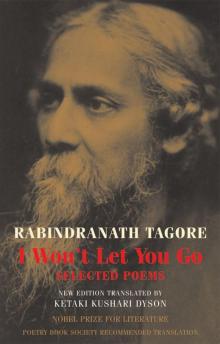 I Won't Let You Go: Selected Poems
I Won't Let You Go: Selected Poems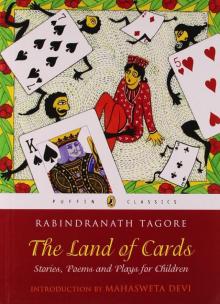 The Land of Cards: Stories, Poems, and Plays for Children
The Land of Cards: Stories, Poems, and Plays for Children The Tagore Omnibus, Volume One
The Tagore Omnibus, Volume One The Boat-wreck
The Boat-wreck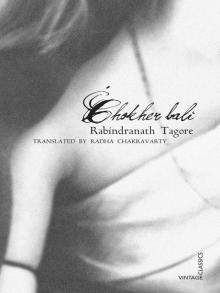 Chokher Bali
Chokher Bali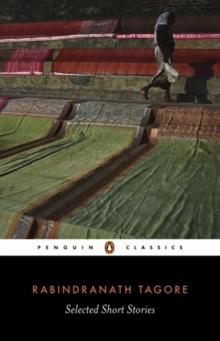 Selected Short Stories
Selected Short Stories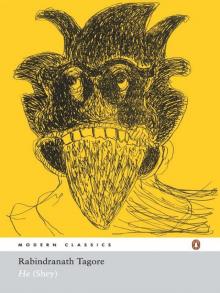 He (Shey)
He (Shey) Letters From a Young Poet 1887 1895
Letters From a Young Poet 1887 1895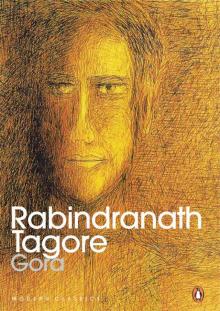 Gora
Gora Tagore Omnibus, Volume 1
Tagore Omnibus, Volume 1 Selected Poems (Tagore, Rabindranath)
Selected Poems (Tagore, Rabindranath)